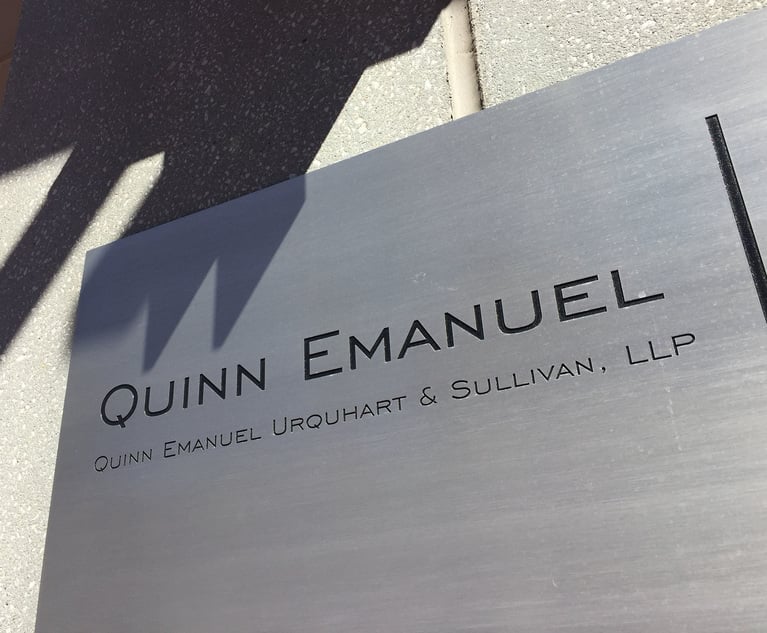DraftKings and FanDuel Fail to Settle Class Actions; Arbitration Fight Ahead
More than 80 class actions alleged the companies committed "insider trading” by allowing their employees to participate in contests using nonpublic information, or they enticed consumers to participate in illegal gambling.
August 20, 2018 at 06:03 PM
4 minute read
 Photo: Bloomberg
Photo: Bloomberg
Fantasy sports websites DraftKings Inc. and FanDuel Inc. have failed to settle a raft of consumer class actions, setting the stage for a fight over arbitration.
Both websites allow players to create their own fantasy teams and win prize money based on the performance of real athletes. More than 80 class actions alleged the companies committed “insider trading” by allowing their employees to participate in contests using nonpublic information, or they enticed consumers to participate in illegal gambling.
In April, both sides asked U.S. District Judge George O'Toole of the District of Massachusetts to halt the litigation in hopes of settling the matter.
 DraftKings, FanDuel in Settlement Talks Over Consumer Class Actions
DraftKings, FanDuel in Settlement Talks Over Consumer Class Actions
But in June, lawyers notified the judge that they hadn't reached an agreement.
Plaintiffs now have cited the U.S. Court of Appeals for the First Circuit's June 25 opinion in Cullinane v. Uber to support their arguments that FanDuel's arbitration agreement wasn't clear to consumers when they signed up to use the site. FanDuel responded on Aug. 17, insisting that its arbitration contract was valid.
“Cullinane does not change the fact that, under the great weight of applicable, on-point authority, the parties here entered into a valid, binding agreement to arbitrate,” wrote FanDuel attorney David McDowell, a partner at Morrison & Foerster in Los Angeles. “FanDuel submits that that agreement should be enforced.”
McDowell did not respond to a request for comment. Co-lead plaintiffs attorney Hunter Shkolnik of Napoli Shkolnik in New York declined to comment.
O'Toole held a hearing a year ago, but has yet to rule on whether to grant motions to compel arbitration filed by both FanDuel and DraftKings.
Both sides submitted additional briefing after the Second Circuit ruled last year for Uber in Meyer v. Uber Technologies—a case challenging a similar online arbitration agreement. In supplemental briefs, plaintiffs said FanDuel's arbitration agreement had some screen details that differed from Uber's. FanDuel countered that its registration process was “substantially similar” to Uber's.
Plaintiffs lawyers now insist that Uber's screen format in Cullinane was “remarkably similar” to FanDuel's. In particular, according to a brief filed last month, the hyperlink was not blue or underlined and was less conspicuous than other aspects on the screen—in FanDuel's case, the large, green “Play Now” button.
In FanDuel's response on Aug. 17, McDowell added that Cullinane was decided under Massachusetts law, not New York law, under which the FanDuel customers agreed to resolve their disputes.
“Although plaintiffs try to brush this distinction aside, in fact, it matters,” McDowell wrote. “In fact, less than one year ago, the Second Circuit Court of Appeals reached the opposite conclusion of Cullinane and found that Uber's internet-based registration process provided sufficient notice of Uber's terms and service, including the arbitration agreement.”
Also, unlike Uber's screen in Cullinane, FanDuel's was “free of purported distractions,” like other buttons, hyperlinks or headers, he wrote. Those distractions—not a hyperlink that wasn't blue or underlined—are what led the First Circuit to conclude Uber's arbitration agreement wasn't valid.
Lawyers have cited both the Second and First circuit decisions in separate litigation over Uber's 2017 data breach.
Related stories:
Fantasy Sports Merger Collapse Could Motivate Settlement of Proposed Class Action
DraftKings, FanDuel Abandon Merger Plans in Wake of FTC Pushback
This content has been archived. It is available through our partners, LexisNexis® and Bloomberg Law.
To view this content, please continue to their sites.
Not a Lexis Subscriber?
Subscribe Now
Not a Bloomberg Law Subscriber?
Subscribe Now
NOT FOR REPRINT
© 2025 ALM Global, LLC, All Rights Reserved. Request academic re-use from www.copyright.com. All other uses, submit a request to [email protected]. For more information visit Asset & Logo Licensing.
You Might Like
View All

Kraken’s Chief Legal Officer Exits, Eyes Role in Trump Administration
3 minute read
FTC Chair Lina Khan Sues John Deere Over 'Right to Repair,' Infuriates Successor
6 minute read
Quinn Emanuel Files Countersuit Against DOJ in Row Over Premerger Reporting
3 minute readTrending Stories
- 1The Legal Status of Presidential Diaries Must Be Clarified
- 2Litigators of the Week: Shortly After Name Partner Kathleen Sullivan’s Retirement, Quinn Emanuel Scores Appellate Win for Vimeo
- 3Litigator of the Week Runners-Up and Shout-Outs
- 4Weil Hires White & Case Partner in Rebuild of London Finance Ranks
- 5Morgan Lewis Closes Shenzhen Office After Less Than Two Years
Who Got The Work
J. Brugh Lower of Gibbons has entered an appearance for industrial equipment supplier Devco Corporation in a pending trademark infringement lawsuit. The suit, accusing the defendant of selling knock-off Graco products, was filed Dec. 18 in New Jersey District Court by Rivkin Radler on behalf of Graco Inc. and Graco Minnesota. The case, assigned to U.S. District Judge Zahid N. Quraishi, is 3:24-cv-11294, Graco Inc. et al v. Devco Corporation.
Who Got The Work
Rebecca Maller-Stein and Kent A. Yalowitz of Arnold & Porter Kaye Scholer have entered their appearances for Hanaco Venture Capital and its executives, Lior Prosor and David Frankel, in a pending securities lawsuit. The action, filed on Dec. 24 in New York Southern District Court by Zell, Aron & Co. on behalf of Goldeneye Advisors, accuses the defendants of negligently and fraudulently managing the plaintiff's $1 million investment. The case, assigned to U.S. District Judge Vernon S. Broderick, is 1:24-cv-09918, Goldeneye Advisors, LLC v. Hanaco Venture Capital, Ltd. et al.
Who Got The Work
Attorneys from A&O Shearman has stepped in as defense counsel for Toronto-Dominion Bank and other defendants in a pending securities class action. The suit, filed Dec. 11 in New York Southern District Court by Bleichmar Fonti & Auld, accuses the defendants of concealing the bank's 'pervasive' deficiencies in regards to its compliance with the Bank Secrecy Act and the quality of its anti-money laundering controls. The case, assigned to U.S. District Judge Arun Subramanian, is 1:24-cv-09445, Gonzalez v. The Toronto-Dominion Bank et al.
Who Got The Work
Crown Castle International, a Pennsylvania company providing shared communications infrastructure, has turned to Luke D. Wolf of Gordon Rees Scully Mansukhani to fend off a pending breach-of-contract lawsuit. The court action, filed Nov. 25 in Michigan Eastern District Court by Hooper Hathaway PC on behalf of The Town Residences LLC, accuses Crown Castle of failing to transfer approximately $30,000 in utility payments from T-Mobile in breach of a roof-top lease and assignment agreement. The case, assigned to U.S. District Judge Susan K. Declercq, is 2:24-cv-13131, The Town Residences LLC v. T-Mobile US, Inc. et al.
Who Got The Work
Wilfred P. Coronato and Daniel M. Schwartz of McCarter & English have stepped in as defense counsel to Electrolux Home Products Inc. in a pending product liability lawsuit. The court action, filed Nov. 26 in New York Eastern District Court by Poulos Lopiccolo PC and Nagel Rice LLP on behalf of David Stern, alleges that the defendant's refrigerators’ drawers and shelving repeatedly break and fall apart within months after purchase. The case, assigned to U.S. District Judge Joan M. Azrack, is 2:24-cv-08204, Stern v. Electrolux Home Products, Inc.
Featured Firms
Law Offices of Gary Martin Hays & Associates, P.C.
(470) 294-1674
Law Offices of Mark E. Salomone
(857) 444-6468
Smith & Hassler
(713) 739-1250










